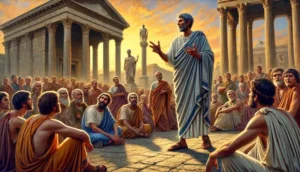In Letters from a Stoic 69, titled “On Rest and Restlessness,” Seneca advises Lucilius on the importance of stability and the dangers of frequent movement. He emphasizes the need for a settled spirit and the benefits of consistent, uninterrupted remedies for the soul.
Seneca begins by addressing Lucilius’s habit of changing locations frequently: “I do not like you to change your headquarters and scurry about from one place to another. My reasons are, – first, that such frequent flitting means an unsteady spirit.” He highlights the necessity of a stable environment to cultivate a unified spirit: “And the spirit cannot through retirement grow into unity unless it has ceased from its inquisitiveness and its wanderings. To be able to hold your spirit in check, you must first stop the runaway flight of the body.”
"The spirit cannot through retirement grow into unity unless it has ceased from its inquisitiveness and its wanderings."
Seneca Tweet This Quote
Seneca’s second reason underscores the importance of continuous, uninterrupted remedies for personal growth: “The remedies which are most helpful are those which are not interrupted.” He advises Lucilius to maintain a consistent environment to facilitate forgetting the past and adjusting to new, healthier habits: “You should not allow your quiet, or the oblivion to which you have consigned your former life, to be broken into. Give your eyes time to unlearn what they have seen, and your ears to grow accustomed to more wholesome words.”
Seneca warns that moving around exposes one to old temptations and desires: “Whenever you stir abroad you will meet, even as you pass from one place to another, things that will bring back your old cravings.” Seneca stresses that in the pursuit of a virtuous life, one must live without expecting rewards: “Vices tempt you by the rewards which they offer; but in the life of which I speak, you must live without being paid.”
Seneca advises Lucilius to focus on preparing for death, either by welcoming it or inviting it when necessary: “If you will give ear to my advice, ponder and practise this, – how to welcome death, or even, if circumstances commend that course, to invite it.” He clarifies that there is no distinction between death coming to us and us going to death: “There is no difference whether death comes to us, or whether we go to death.”
"If you will give ear to my advice, ponder and practise this, – how to welcome death, or even, if circumstances commend that course, to invite it."
Seneca Tweet This Quote
Seneca encourages Lucilius to understand that no one dies except on their own day and that the time left behind was never theirs to begin with: “Seneca encourages Lucilius to understand that no one dies except on their own day and that the time left behind was never theirs to begin with.”
"There is no difference whether death comes to us, or whether we go to death."
Seneca Tweet This Quote
In summary, Seneca’s letter emphasizes the importance of a stable and consistent environment for personal growth, the dangers of succumbing to past temptations, and the necessity of preparing for death with a calm and accepting mindset.
***** Letters from a Stoic Key Takeaways is a collection of short key takeaways from the letters sent by Seneca to Lucilius. Read each letter’s key takeways here .






